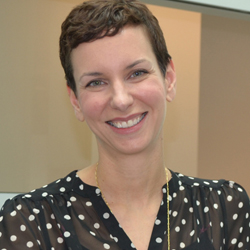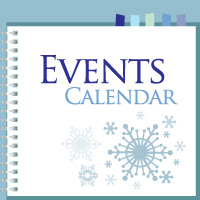In the Spotlight
Rebecca Neto, RN, BN, MN
 Rebecca has been a registered nurse working in community for 15 years. She graduated from the University of Manitoba with a Bachelor of Nursing and has worked in Winnipeg in community settings throughout her career. She started working as a community home care nurse but has also been staff development coordinator for Home Care, a primary care nurse, a team manager for River Heights, and a primary care clinical specialist. A year and a half ago, she finished her Master's of Nursing, which focused on administration. For the past two years, she's been in a newly created role. As Manager of Staff and Clinical Education for Community Health Services, some of her priorities are student placements, orientation and staff development. Her primary focus is to seek opportunities for partnerships between the programs of Community Health Services, to leverage the strengths and avoid duplication of efforts.
Rebecca has been a registered nurse working in community for 15 years. She graduated from the University of Manitoba with a Bachelor of Nursing and has worked in Winnipeg in community settings throughout her career. She started working as a community home care nurse but has also been staff development coordinator for Home Care, a primary care nurse, a team manager for River Heights, and a primary care clinical specialist. A year and a half ago, she finished her Master's of Nursing, which focused on administration. For the past two years, she's been in a newly created role. As Manager of Staff and Clinical Education for Community Health Services, some of her priorities are student placements, orientation and staff development. Her primary focus is to seek opportunities for partnerships between the programs of Community Health Services, to leverage the strengths and avoid duplication of efforts.
"It's pretty amazing the power nurses have to affect a population's health. I find that very satisfying"
Why did you decide to work in community?
When I was in my Bachelor of Nursing program, I needed to move and felt claustrophobic on the ward. I had a community placement and it really felt like a much better fit for me.
How is working in community different than an acute care or long term care setting?
In the community, you are in the client's domain so the power shifts to the person. It's rewarding to help the person at home, where the person is in charge. Ultimately the person can choose to participate or not, so the question becomes how can we support, engage, and help them to achieve health goals?
Community Health Services can be difficult to explain, but I have heard it likened to the hospital. For example, a hospital is a facility that houses different programs, like surgery or emergency. So does the community, but the difference is that the programs, such as primary care, home care, and population and public health, are delivered in settings such as clients' homes, community centers, or clinics. I once heard the community referred to as a facility without walls.
What impact does your community background play in your current role?
I have had various roles in the different community programs throughout my nursing career. Because of that, I've learned a lot about our internal systems and overall vision. This helps me understand how to best work while keeping in mind how to get the greatest benefit for employees, programs, and the people we work with.
What does your current role involve?
The intention of this position was to be rooted in the community. Therefore, I report to a Community Area Director, but my focus is regional. My goal is to work among community programs and look for opportunities to partner together in education to centralize resources that are traditionally held in silos.
Along with learning from each other, it all comes back to what our partnerships mean for the patients. My role considers developing effective ways to create best practices and sustain it with knowledge translation. A lot of this, I've found, is about building trust and relationships.
What is a typical day like?
It's cliché but there really isn't a typical day. For the most part, it's a desk job but I'm rarely at my desk. I travel to the community offices to meet with people.
I also contribute to working groups for regional initiatives and sub groups. My role there is typically to ask how things fit into the community or provide insights about community needs.
A lot of my focus is planning, too. I set goals so that I remember to contribute to my overall priorities. I'm working on many things at a time, so this helps me stay on track.
What role does communication play?
Sharing regional information and implementing projects are large parts of my role. It's important to me to share content mindfully, and put information into context so that my target audience understands the message. I've found that this helps put people at ease. It's one thing to say there's a change in process, for example. It's another to explain exactly what that change means and how it will impact people.
Strategizing about effectively communicating takes time, because I consider that different stakeholders need different information. But I've found it's worth the investment in time.
Can you talk about the role you play in educating?
Formally, I deliver presentations to groups about community health services. A lot of people aren't aware about health services that are available, or how to access them. I'm happy to share that information and help people better understand what's available. I also chair a group where we plan education within the Community Health Services setting.
I do a lot of informal teaching behind the scenes to help people understand the larger, regional perspective and the context of various initiatives. It's important that people working in community see how their work fits into overall goals of the healthcare system. When you understand what you bring to the table and how that fits into the bigger picture, I've found you can be inspired in different ways to make your contribution.
What energizes you?
There are always things to learn, and I am passionate about learning. When I took my Master's, I learned a lot and expanded my view. The experience was powerful because it showed me that there is a lot that I don't know, and how there is so much more I can learn. I am energized at the possibility of what people can do when they work together with a common goal.
What role does Collaborative Care play in the community?
I attended the Educating Health Providers in Collaborative Care in 2013. It was a really good opportunity to learn about Collaborative Care theory, and how the six competencies apply to me and the work that is done in the community.
There is a lot of work underway in the community regarding collaborative care. Primary care clinics have a variety of health care providers and understand that collaboration is a skill that teams must develop. Clinics have identified projects to help boost Collaborative Care. A patient huddle every morning, reducing the wait list (like they did at ACCESS Downtown) . . . these are examples of Collaborative Care in action in the community.
What are your reflections on nursing?
What I think is the neatest thing about nurses may be frustrating to others - the ambiguity of the nursing role in the community. The nursing role in community changes based on what people need, so it's important to be adaptable, flexible and responsive in supporting the population with what it needs.
As a nurse, I do my best work being invisible - I support systems that help people maintain their health. It's pretty amazing the power nurses have to affect a population's health. I find that very satisfying.
I had a conversation with my eight year old daughter, who was asking, "Mom, how can you be a nurse when you have no uniform or stethoscope?" It's harder to explain and yes, it looks different but the effect of nursing in the community is very powerful.
What gets you out of bed in the morning?
My family. I have a 12 year old son and an eight year old daughter. Our family has been through a lot in the past two years, because my husband was diagnosed with ALS. He recently passed away peacefully but it's a major loss for both me and the kids.
You're such a positive person . . . how, when you're faced with these kinds of challenges?
When my husband received his diagnosis, we decided to choose to create peace and happiness, every day. Some days it's easier than others. That choice will continue be an important one for us as we adjust to a new normal without him. Our family uses a lot of humour to cope. I know it's important for me to role model these choices for our kids. My friends are a supportive network for me and regular workouts also help my mental and physical health.
What has influenced your nursing practice?
In the beginning, I thought that nursing is a mastery of skills. Knowing that I have gained experience, I reflect that my nursing education provided me with much more than skills. It took me a while to fully understand what I learned in University. But my current view of nursing is as a result of my expanded education and experience, which helped give me the confidence to try things out.
Early on my mentors encouraged me. I had one mentor who told me that I had the skills that would translate into being a good manager. Hearing that meant a lot and I often wonder what she saw. But it taught me an important lesson: if I identify a strength in a student, I need to pass that information along to them. It ultimately encourages students about their potential in the health care system. It also helps me encourage employees to set goals and use their strengths to fulfill their potential.
Watching how other nurses practice from a distance has been a powerful learning experience for me. I like to admire from a distance and learn how difficult situations are handled. I've discovered often people are very welcoming and supportive in answering questions I may have, and that inspires me.
If there's an educational opportunity, I take it. Things have fallen into my lap that I wouldn't have sought out, but I've learned to say yes to those moments when they come up because you never know what you're going to learn or experience or how that might open things up for you in a different way. This is especially important, I feel, where education opportunities are concerned. If there's something you're interested in, why wouldn't you do it? There is a lot of opportunity to be taken. It's one advantage of working in such a large system . . . you just need to go for it.
